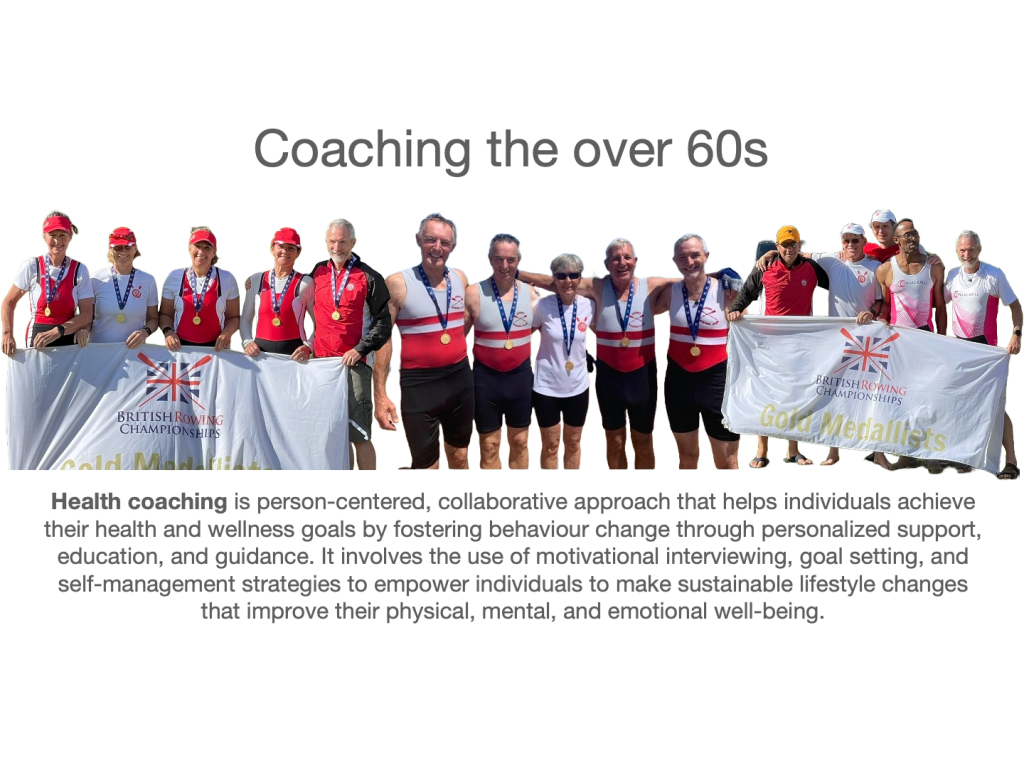Health coaching can be an incredibly valuable tool for older adults, particularly for those aged 60 and over, in addressing a variety of health issues such as loneliness, obesity, lack of fitness, and mental health and well-being.

Here’s how health coaching could be beneficial in this context:
1. Personalized Support for Managing Health Conditions
Chronic Conditions: Given that 42% of adults over 65 reported having a longstanding physical or mental health condition, health coaching can offer tailored strategies for managing these conditions. A coach could help older adults create realistic and sustainable health plans that address their specific needs, from managing diabetes or arthritis to dealing with anxiety or depression.
Behavioral Changes: Health coaching focuses on fostering positive lifestyle changes. For those over 60, this could include encouraging healthier eating habits (such as increasing the proportion of people who meet recommended dietary guidelines) or quitting smoking, which is more common among younger groups.
2. Combating Loneliness
Social Connection: Though fewer older adults report feeling lonely compared to younger people, loneliness still affects a significant number, especially those with longstanding illness (34%). Health coaches could support older adults in finding new ways to stay socially engaged, whether through community groups, exercise classes, or even virtual communities. This is particularly important for those who rarely socialize outside their household, a group with much higher loneliness rates.
Blended Approach: A blended coaching approach that incorporates both online and in-person sessions could help older adults who are less mobile or socially isolated, providing a way to stay connected even if they can’t leave their homes often.
3. Tackling Obesity and Fitness
Fitness Goals: With fewer than half of adults aged 65 and over meeting the minimum weekly exercise guidelines, health coaches can play a pivotal role in developing customized exercise plans that are suitable for older adults. This might include low-impact exercises, strength training, or balance exercises designed to improve mobility and reduce the risk of falls.
Weight Management: For older adults struggling with obesity, a coach could help with setting achievable weight-loss goals through nutritional advice, meal planning, and consistent encouragement, improving both physical health and quality of life.
4. Mental Health and Well-being
Coping Mechanisms: Mental health challenges such as anxiety, depression, and stress are common among older adults, especially those with longstanding illnesses. Health coaching can help individuals develop coping mechanisms such as mindfulness, stress management techniques, and cognitive behavioral strategies to improve mental well-being.
Encouragement and Accountability: Having regular check-ins with a health coach provides accountability and a sense of encouragement, which is vital for maintaining mental health.
5. Preventative Health and Healthy Aging
Holistic Wellness: Health coaching can promote overall healthy aging by focusing on prevention. For example, coaches can help clients improve their diet, stay physically active, and manage stress, all of which can reduce the risk of chronic diseases and enhance longevity.
Vaccine Guidance: Given the increase in vaccine hesitancy with age (19% in those 65 and over), a health coach could also play a role in educating and reassuring older adults about the benefits of vaccinations, leading to better health outcomes.
6. Flexible and Accessible Approaches
Blended Coaching: By offering both online and in-person sessions, health coaching can be more accessible to older adults with varying needs and mobility levels. Virtual coaching can offer flexibility and continuity, especially for those who are homebound or living in rural areas, while in-person sessions can provide a more personal touch for those who prefer face-to-face interactions.
Adaptability: Health coaches can adjust their methods to fit the technology comfort level of the older adult, offering phone calls, video sessions, or even text messaging for those who might not be as comfortable with more advanced tech.
Conclusion
Health coaching offers older adults the support they need to address the unique health challenges that come with aging, including loneliness, obesity, lack of fitness, and mental health issues. Through a personalized, flexible, and holistic approach, coaches can help seniors maintain or regain their physical health, improve their emotional well-being, and stay connected to their communities, ultimately leading to a higher quality of life.
The combination of online, in-person, or blended approaches makes health coaching a versatile and accessible option for older adults, helping them to stay proactive in managing their health.
